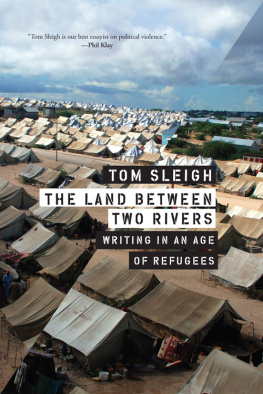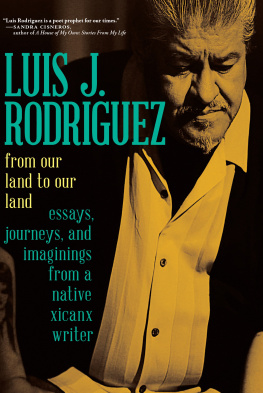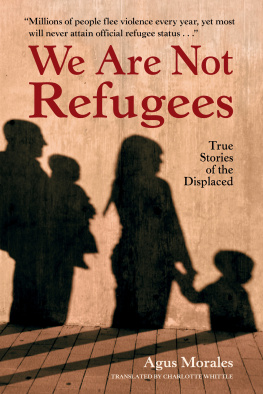THE LAND BETWEEN TWO RIVERS
WRITING IN AN AGE OF REFUGEES
TOM SLEIGH
Graywolf Press
Copyright 2018 by Tom Sleigh
The author and Graywolf Press have provided this e-book to you for your personal use only. You may not make this e-book publicly available in any way. Copyright infringement is against the law. If you believe the copy of this e-book you are reading infringes on the authors copyright, please notify Graywolf Press at: us.macmillanusa.com/piracy.
This publication is made possible, in part, by the voters of Minnesota through a Minnesota State Arts Board Operating Support grant, thanks to a legislative appropriation from the arts and cultural heritage fund, and a grant from the Wells Fargo Foundation. Significant support has also been provided by Target, the McKnight Foundation, the Lannan Foundation, the Amazon Literary Partnership, and other generous contributions from foundations, corporations, and individuals. To these organizations and individuals we offer our heartfelt thanks.

Published by Graywolf Press
250 Third Avenue North, Suite 600
Minneapolis, Minnesota 55401
All rights reserved.
www.graywolfpress.org
Published in the United States of America
ISBN 978-1-55597-796-2
Ebook ISBN 978-1-55597-986-7
2 4 6 8 9 7 5 3 1
First Graywolf Printing, 2018
Library of Congress Control Number: 2017938020
Cover design: Kyle G. Hunter
Cover art: Sadik Gulec / Shutterstock.com
To the memory of Seamus Heaney and Andy Needham, and for Christopher Merrill
THE LAND BETWEEN TWO RIVERS
I
The Deeds

When we drove into Qana last year, Joseph told me, scanning the gray concrete houses on either side of the road, we heard flames roaring, the sound of the jets, people screaming, and the ringing of cell phones. He looked at me and shrugged. The relatives of people were calling to see if they were OK. Joseph worked for the Red Cross during the 2006 war with Israel and was one of the first to enter the village after an Israeli bombardment killed twenty-eight Lebanese civilians. Soft-spoken, slight, he was solicitous on the surface, but underneath he seemed watchful, even wary. When I hired him as my driver and interpreter to take me south from Beirut, I knew only that he drove a taxi with his father and worked as a draftsman in an engineering firm to pay his way at Lebanese University. But then he offered to take me to Qana. He could show it to me, he said; he could tell me what hed seen.
To get to Qana, we needed military clearance, and so wed stopped at the central army compound in Sidon, one of the major cities in southern Lebanon. The Lebanese intelligence officer who handled foreign press was dressed in blue jeans and a checked Oxford, his shirttail hanging out. His wire-rimmed glasses gave him a bemused air, and his thoroughly unmilitary bearing unsettled me. I knew that he knew that I knew he had all the power, and while he seemed to enjoy this, he also seemed to appreciate the absurdity of his own position. Why should he be the one to control who went to the south of Lebanon?
This is not my decision, he said. You need to get permission from the military authority in Beirut.
But, I explained, when we came yesterday to the base, I was told that we were to talk to you, and that you could grant us permission.
Who are you writing your story for?
I tried to explain that VQR was a general-interest magazine and that I wanted to tell the Lebanese side of the story of the 2006 war against the Israelis. He could barely keep from rolling his eyes: How many times had someone like me come in and said the same thing? And which side of the war would that bethe Druze, the Shia, the Sunni, the Christians?
I wasnt exactly a seasoned reporteras a matter of fact, Id spent most of my writing life as a poet. This was my first so-called assignment, and the role of foreign correspondent felt a little outsized. As the officer stared me down, I realized his checked Oxford was, in fact, a cowboy shirt, complete with snaps and pocket flaps. And when I noticed his cowboy boots shining under the rickety metal table, on which a comic book and various official-looking papers were spread in casual disarray, I began to feel a little desperate, realizing that whatever Id expected to find in Lebanon would be of an order of complexity beyond any of the books Id read, or the people Id talked to, in preparation for the trip. I started to babble about how close to Washington, DC, my magazine was and how it was read by important DC politicians. I could picture my editor grinning, exhorting: Shovel faster, boy-o , shovel faster . At last the officer smiledquite genially, in factand lifted his hand the way a casting director might to spare himself one moment more of a bad actor. He asked Joseph where we wanted to go.
Joseph, his face tense during the entire exchange, wanting to help but knowing how capricious the military authorities could be, said simply, Qana. The officer wrote a few words in Arabic on a scrap of paper and said, This will get you where youre going. Show it at all the checkpoints. He then shrugged good-naturedly: Beirut has many good nightclubs and shops. I hope you will visit them. I assured him I would. Then he looked at me and said, Everyone says that we Lebanese are good at two things. Fighting. And shopping. I nodded and smiled, he nodded and smiled, and Joseph and I went back to the car.
On our way south we inched along in the dust cloud kicked up by dump trucks, convoys of United Nations Interim Forces in Lebanon (UNIFIL), and Lebanese Army transport vehicles. All the coastal bridges had been bombed to rebar and rubble and were now being jackhammered apart by work crews. As the sun beat on the sea in the distance and the rocks riled the waves into scuffed-up patches of foam, I remembered that Qana was the place where Jesus worked his first miracle. At a wedding feast, Jesus turns water into wine and inadvertently humiliates the bridegroom for serving up plonk, at least compared to Jesuss miraculous vintage. That I was on my way to this scene of biblical faux pas and realpolitik slaughter in a cab Id rented for the daythe logo TRUST TAXI emblazoned across the rear windowwas just the sort of irony that made Lebanon Lebanon.
Checkpoint after checkpoint, we flashed our flimsy scrap of paper and my passport at the soldiers lounging in their flimsy wooden booths, or just as often leaning on stacks of tires painted red and white. Between checkpoints, I studied the map, locating Qana, then searching out each of the twelve official Palestinian refugee camps in Lebanonthough by now there was nothing camp-like about them. These were established neighborhoods built alongside Lebanese neighborhoods, in the capital city of Beirut and throughout the country, and they were home to somewhere between 250,000 and 400,000 refugees, depending on whose statistics you believe. Three generations had grown up in these makeshift cinderblock-and-rebar quarters since the ArabIsraeli War of 1948 and 1949, when over 700,000 Palestinians had fled or been driven from their homes by the Israeli forces. In the subsequent armed conflicts between Israel and Lebanon, Israel had labeled them terrorist strongholds, while Palestinians saw them as centers of resistance against Israeli aggression.
















